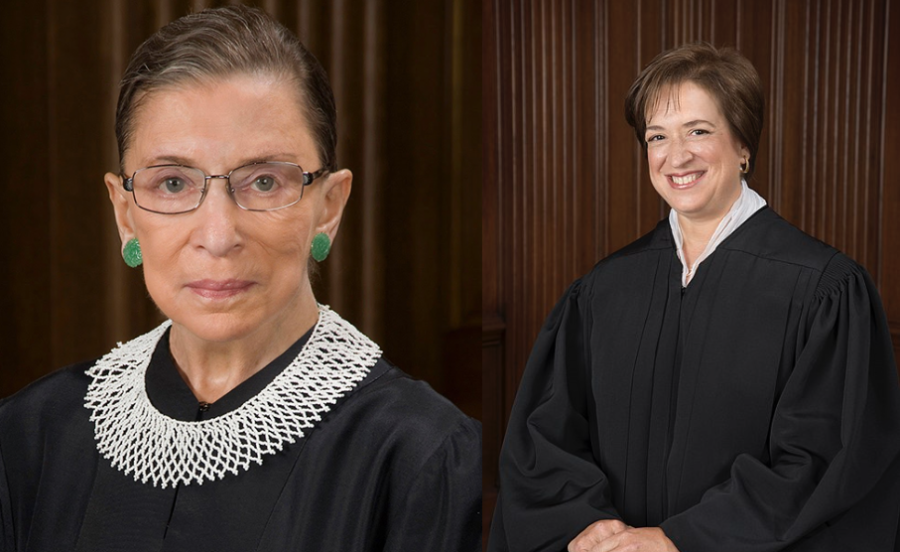Two Jewish women are now on the High Court
November 1, 2010
Donning a Harry Potter-esque robe, frying latkes in December and talking politics all the time have one thing in common: They’re all part of being a Jewish woman serving on the United States Supreme Court. With Justice Elena Kagan sworn in Aug. 7, joining Justice Sonia Sotomayor and Justice Ruth Bader Ginsburg, for the first time ever there are three female justices serving, and two of them are Jewish.
Also like Harry Potter, both Ginsburg and Kagan have not been afraid to shake things up. Justice Ginsburg was a trailblazer in her time, only the second woman on the Court, and Justice Kagan managed to change the way bat mitzvahs were celebrated at an important Orthodox Jewish institution, the famed Lincoln Square Synagogue in Manhattan under Rabbi Shlomo Riskin.
“We created the first women’s service,” said her bat mitzvah tutor, Cantor Sherwood Goffin – who was principal of Lincoln Square Hebrew School at the time – in a telephone interview with The Boiling Point. “We weren’t that surprised, but had never done it before, so we had to figure something out.”
Having a public bat mitzvah was unheard of in the Orthodox world when 12-year-old Kagan made her request in 1973; in fact, it is still somewhat controversial. But the early ‘70s were a time when women and girls were looking for new ways to participate in religious life.
The future justice asked to chant from the Torah on Shabbat morning, and Rabbi Riskin — now chief rabbi of Efrat, Israel, and someone who has spoken at Shalhevet several times — worked out a compromise that is common in Los Angeles today: she chanted Megillat Rut before a women’s prayer group, on Friday night, and gave a speech discussing it.
“The New York Times printed a report saying that she had fought with Rabbi Riskin,” Cantor Goffin said. “I wrote back that she didn’t fight. It’s something that they decided on.”
Rabbi Riskin considered Elena Kagan a “star pupil,” according to that article.
“We crafted a lovely service, but I don’t think I satisfied her completely…But she certainly raised my consciousness,” Rabbi Riskin said. (”http://tinyurl.com/BPKagan)
Today at Lincoln Square, girls are permitted to read from the Torah on Shabbat morning and lead the entire tefillah, though still in the synagogue’s women-only service, according to Elana Stein Hain, the Community Scholar at the synagogue.
Moreover, Ms. Hain said, girls are now obliged to give a sermon for the entire congregation, regardless of whether they have chosen to read from the Torah or lead the prayers.
“The girl will learn, sometimes will study with a member of the clergy, and then give a speech in front of the whole synagogue after services,” said Ms. Stein Hain in a phone interview.
The future justice later attended services at Harvard Hillel, a small service near campus, when she was dean of Harvard Law School, according to the Jerusalem Post. (http://tinyurl.com/BPKaganHillel)
“I don’t think it’s a secret I am Jewish,” Ms. Kagan said in response to a question at her confirmation hearing last summer. “The state of Israel has meant a lot to me and my family.” (http://tinyurl.com/BPIsrael).
Today’s other Jewish female justice, Justice Ginsburg, is the daughter of two Jewish immigrants. Now 70, she attended services at the East Midwood Jewish Center, a Conservative synagogue in New York, where she read from the Torah for her bat mitzvah at age 13. That same year she served as the “Camp Rabbi” at Camp Che-Na-Wah in Minerva, New York. (http://tinyurl.com/BPGinsburgCamp)
According to the Jewish Women’s Archive, growing up during World War II also exposed Justice Ginsburg to anti-semitism.
“I have memories as a child, even before the war, of being in a car with my parents and passing a … resort with a sign out in front that read: ‘No dogs or Jews allowed,’” she said at her confirmation hearings, in response to a question about her sensitivity to racial discrimination.
“One couldn’t help but be sensitive to discrimination living as a Jew in America at the time of World War II.” (http://tinyurl.com/BPGinsburgJewish)
Addressing the Jewish Council of Public Affairs in 2002, Justice Ginsburg said Judaism has influenced her thinking throughout her life.
“I am a judge born, raised and proud of being a Jew,” she said. “The demand for justice runs through the entirety of Jewish history and tradition. I hope…I will have the strength and the courage to remain constant in the service of that demand.” (http://tinyurl.com/BPGinsburgIdentity)













